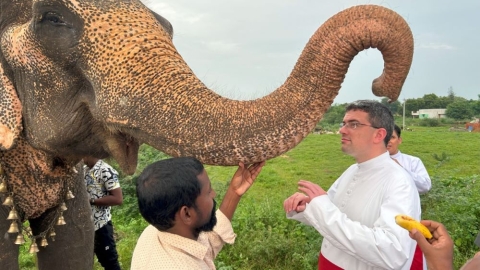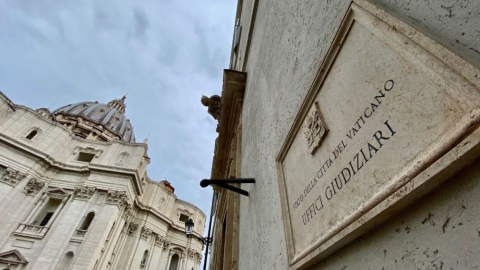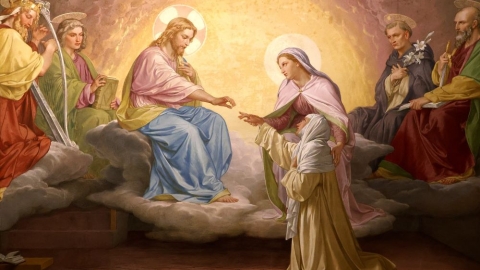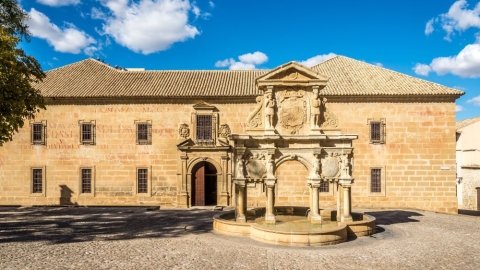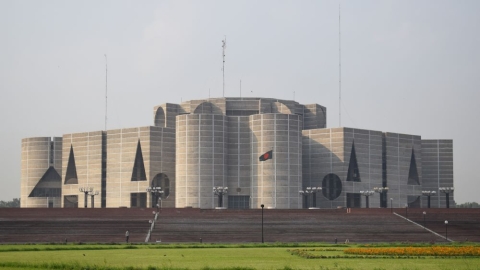The African Continent Rejects Fiducia Supplicans

Cardinal Fridolin Ambongo
While around 15 African episcopal conferences have ruled on the blessing of irregular or same-sex couples, Cardinal Fridolin Ambongo, president of the Symposium of Episcopal Conferences of Africa and Madagascar (SECAM), has asked all the conferences for a commentary on Fiducia supplicans with a view towards producing a single African document.
The document, expected at the end of January or the beginning of February, was published on January 11, 2024. The speed with which it was produced shows the determination of the African episcopates in this matter. It should be remembered that Cardinal Ambongo is a member of the C9, the council of cardinals established by Pope Francis shortly after his election, to prepare the reform of the Curia, carried out by Praedicate Evangelium.
The Congolese cardinal gave an interview to Vatican Radio in French at the beginning of January. He explained that, “The ambiguity of this declaration… arouses much perplexity among the faithful and I believe that, as pastors of the Church in Africa, we must make a clear declaration on this question in order to give a clear guidance to our Christians.”
He added: “As soon as the document was published, there was a reaction of anger and frustration from our faithful. I myself have received numerous messages from our faithful asking if it was really true that this document was signed by His Holiness, etc. There was a lot, a lot of anger.”
A Document for All of Africa
Therefore, SECAM published a summary of the responses from all of the African Episcopal Conferences. The conclusion is unequivocal: there will be no blessing of homosexual couples in the churches of Africa, because such unions are “contrary to the will of God” and homosexual acts are “intrinsically disordered and contrary to the will of God and natural law.”
The title of the document, which takes the form of a message, is clear: “No blessing for homosexual couples in the African churches.” It is, according to the subtitle, the “Synthesis of the responses of the African Episcopal Conferences to the Declaration Fiducia supplicans.” From the first paragraph, the text specifies that the document “received the agreement of Pope Francis and Cardinal Victor Fernandez, prefect of the Dicastery for the Doctrine of the Faith.”
It is a “consolidated summary of the positions adopted by various National and Inter-territorial Episcopal Conferences across the African continent, in response to the publication of the Declaration Fiducia supplicans of the Dicastery for the Doctrine of the Faith of December 18, 2023.”
Due to the shock wave caused in Africa by this Declaration, the “misconceptions and unrest in the minds of many lay faithful, consecrated persons, and even pastors,” SECAM is now publishing the synthesis of the responses of the African Episcopal Conferences.
This synthesis first reaffirms the immutable doctrine on marriage and sexuality and concludes: “Therefore, rites and prayers that could blur the definition of marriage - as an exclusive, stable, and indissoluble union between a man and a woman, open to procreation - are considered unacceptable.”
The message continues by stating that “clergy are encouraged to provide welcoming and supportive pastoral care, particularly to couples in irregular situations.” As for people with homosexual tendencies, they “must be treated with respect and dignity, while reminding them that unions of persons of the same sex are contrary to the will of God and therefore cannot receive the blessing of the Church.”
Position on Homosexual Unions and Same-Sex Partnerships
The text notes that “the Episcopal Conferences generally prefer - each Bishop remaining free in his own diocese - not to offer blessings to same-sex couples. This stems from concern about potential confusion and scandal within the Church community.”
A justification of this position follows. First magisterial: “The constant teaching of the Church describes homosexual acts as ‘intrinsically disordered’ (Congregation for the Doctrine of the Faith, Declaration Persona Humana, n. 8, 1975) and contrary to the natural law.”
The reason is that “these acts, considered as closing the sexual act to the gift of life and not proceeding from a genuine affective and sexual complementarity, must not be approved under any circumstances (Catechism of the Catholic Church, n. 2357).”
Then come the scriptural sources. Many bishops “cite passages which condemn homosexuality, notably Leviticus 18:22-23, where homosexuality is explicitly prohibited and considered an abomination.” One episcopal conference added the scandal of the homosexuals of Sodom (cf. Gen 19:4-11), was so abominable that it led to the destruction of the city.
“In the New Testament, Saint Paul, in the Letter to the Romans, also condemns what he calls unnatural relationships (cf. Rom 1:26-33) or shameful morals (cf. 1 Cor 6:9-10).”
Finally, the bishops rely on natural law, which is expressed in the cultural context of Africa, regarding marriage and family: “unions of persons of the same sex . . . are seen as contradictory to cultural norms and intrinsically corrupt.”
Related Article:
Final Declaration
In conclusion “the Episcopal Conferences across Africa … believe that the extra-liturgical blessings proposed in the Declaration Fiducia supplicans cannot be carried out in Africa without exposing themselves to scandals.. . . For this reason, we, the African Bishops, do not consider it appropriate for Africa to bless homosexual unions or same-sex couples.”
Finally the bishops conclude saying, We, African Bishops insist of the call for the conversion of all,” recalling that “Jesus also stretches out His hand to the sinner so that he may rise, so that he may convert (Mk 1:5). After showing such tenderness to the woman caught in adultery, He said to her: “Go, and from now on, sin no more” (Jn. 8:11).
(Source : SECAM/InfoCatolica – FSSPX.Actualités)
Illustration : AciAfrique
